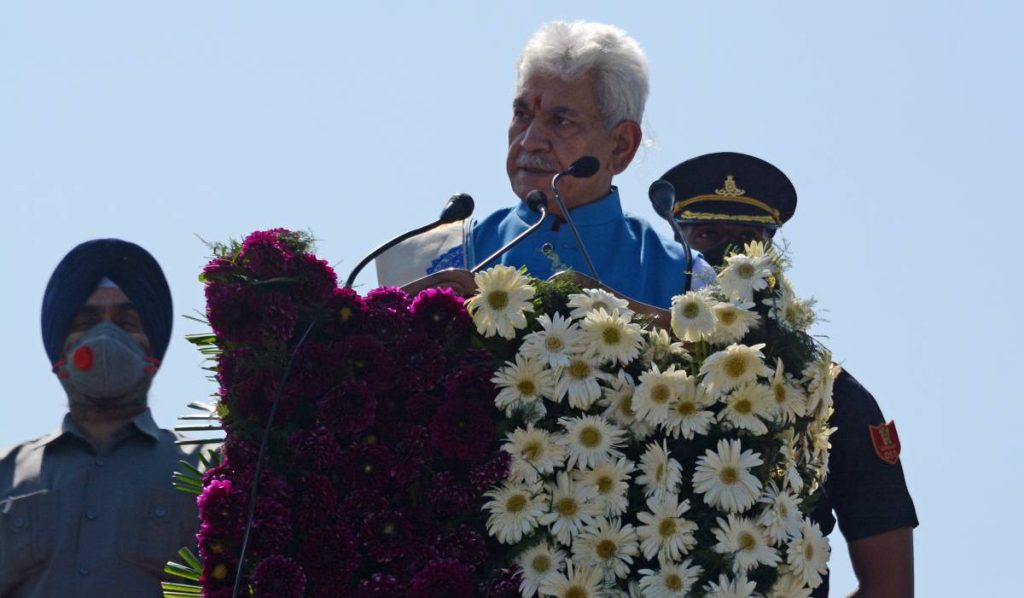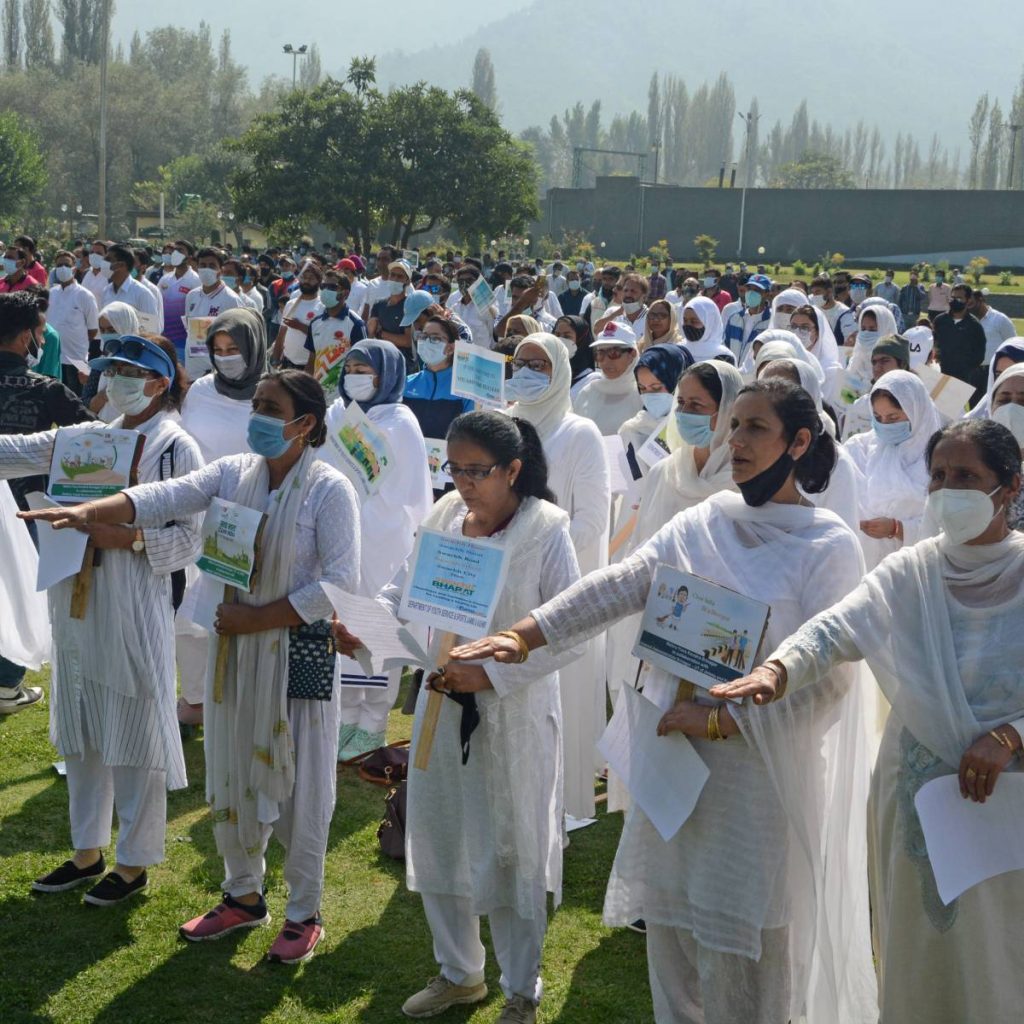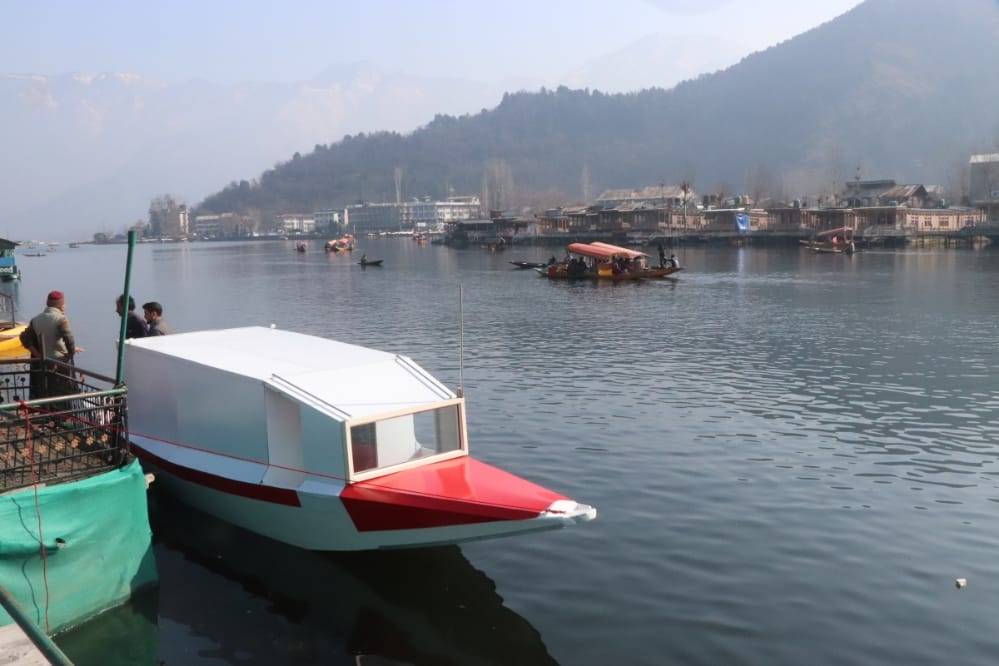In a nutshell addressing the public grievances has been the priority. The initiative to reach out to the people and stay in touch with them has filled in the void which used to exist prior to August 5, 2019…reports Asian Lite News.
There was a time, when people used to stand in long queues outside the Civil Secretariats in Srinagar and Jammu cities to reach the helmsmen. The visiting hours were fixed and the lucky ones only could somehow get a chance to get heard. Many people had to return disappointed as the time used to run out. Ineffective and weak grievance redressal system in the erstwhile Jammu and Kashmir State was one of the major reasons for disconnect between the government and the people.
For elected representatives governance was never a priority. They remained busy in raking up the issues which did not fall in their domain and harping about the validity of Kashmir’s accession with India. A common man, who lives for his survival, found it very difficult to reach the men or women, whom he had voted for. Issues like proper roads, sanitation, electricity, water, education and other basic amenities were the least discussed problems.
However, after August 5, 2019 — when the Centre announced its decision to scrap J&K’s special status and divided it into two union territories — the government emphasized on making the grievance redressal system effective in the newly carved out union territory.
Within two years change is clearly visible in ‘Naya Jammu and Kashmir’ as people no longer have to wait with applications in long queues outside the civil secretariats in Srinagar and Jammu, nor do they have to be lucky enough to be heard. The government has set up help lines and online grievance redressal portals for a common man to drop his complaint and check the status about the action taken either online or over the phone. The officials are just a phone call away. The system which used to remain inaccessible has become accessible.
Just a few months after J&K’s transition into a Union Territory, Department of Administrative Reforms and Public Grievances (DARPG) organized two conferences in J&K on good governance on November 15-16, 2019 and conference on Ek Bharat-Shreshtha Bharat with focus on Jal Shakti and Disaster Management on November 30- December 1, 2019. The aim of these events was to drive home a point that the system has changed and redressing the grievances of a common man has to be a priority.
On August 16, 2020, the Government of India assigned the task of improving the grievance redressal system in Jammu and Kashmir to the Department of Administrative Reforms and Public Grievances (DARPG). The DARPG was asked to enhance the collaboration with the Jammu & Kashmir Government to revamp the “Awam-ki-Awaz” portal with mapping of last mile grievance officers for improved quality of grievance redressal and reduced timelines in effective disposal of cases (1). Since then there has been no looking back as the administration is no longer inaccessible. The online portals are working round the clock and the genuine grievances of the people are being redressed in the shortest possible time. This initiative has helped to create a transparent, accountable and citizen-friendly effective administration in line with the vision to bridge the gap between the government and the people.
Jammu & Kashmir is the first Union Territory in the country to have district-level grievance offices with the central grievance portal to ensure prompt action. The grievance office has been integrated with the Centralised Public Grievance Redress and Monitoring System (CPGRAMS) portal.
New grievance redress system
On September 11, 2020, J&K Lieutenant Governor, Manoj Sinha, launched the Jammu and Kashmir Integrated Grievance Redress and Monitoring System (JK-IGRAMS). The purpose of the new system was to create an interface with the public and focus on governance issues in J&K.
Idea behind the initiative was to tell the people that the government cares for them and it’s always ready to hear and help them. The officials, who were asked to handle the system, were told in clear terms that a common man wants a sympathetic, courteous, responsive, and helpful administrative set-up. The JK-IGRAMS provides minute by minute status updates of the grievances on the portal. District Collectors and Deputy Commissioners are the primary nodes for receiving, disposing and monitoring grievances.

On October 22, 2020, another step was taken to make the grievance redressal system more effective, LG Manoj Sinha held the first run of “LG’s Mulaqaat”- Live Public Grievance in Srinagar. It was altogether a different experience for the participants who interacted face to face with the LG and top officers through video conferencing and put across their problems. In the very first round of the live mulaqaat with people, the LG heard nineteen grievances out of which fifteen were addressed on the spot.
Talking to the Indian Express, Secretary, Public Grievances, J&K, Simrandeep Singh had stated that the grievance redress systems generally work only when top leadership directly monitors or takes interest.
Explaining the mechanism Singh had stated that the LG Mulaqaat is an interactive platform wherein the LG and Chief Secretary directly review the performance with all administrative secretaries, Deputy Commissioners, Superintendents of Police and senior officials from various departments.
Till date LG Sinha has held seven rounds of live mulaqaats. His advisors meet the people in Srinagar, Jammu and other places every week on a rotational basis. The message is clear that people are supreme, they are the fountain head of the power and no one can ignore them. They have to be heard and accommodated.
Stay in touch with people
After the outbreak of Covid-19 second wave in the union territory in April-May this year the grievance redressal system had become a bit slow, but soon after the number of cases declined the J&K government in June this year directed the administrative secretaries to regularly hold meetings with the public.
An order issued by the General Administrative Department stated: “It has been observed that due to the prevailing Covid-19 pandemic, the government-public interaction has been affected in recent weeks. Due to limited mobility, the general public having grievances in various departments could not visit the civil secretariat for their redressal therefore it has been decided that all Administrative Secretaries shall be available for attending public grievances on daily basis (except on days of tour) between 2.30 to 3.30 p.m. in person or on notified telephone numbers or on video conferencing facility for redressal of public grievances.”

In a follow up action the J&K Government on September 30 this year directed all the Administrative Secretaries and Deputy Commissioners to submit weekly appraisal of public interactions and the grievances redressed by them during fixed daily hearings.
In a nutshell addressing the public grievances has been the priority. The initiative to reach out to the people and stay in touch with them has filled in the void which used to exist prior to August 5, 2019.
In ‘Naya J&K’ common man is the priority
In ‘Naya J&K’ addressing public grievances is not only about how many complaints have been received and how many have been disposed of, it’s about talking to the people directly and reaching out to them. The deadlines have been fixed to ensure that complaints don’t remain lingering.
Union Minister of State for Home Affairs, Nityanand Rai, who recently visited frontier district of Kupwara in connection with the Centre’s outreach programme lauded the people of Kashmir for showing interest in peace and development and assured them that the grievance of every Kashmiri would be resolved in a time bound manner.
To ensure that no one is left out from the ambit of grievance redressal system a portal was launched for Kashmiri migrants in August this year with the aim to address the issues and concerns related to the land and properties of the migrants. The portal www.jkmigrantrelief.nic.in deals with the subject matter of the grievances that ranges from correction of encroachments, trespassing and alienation by way of fraud or distress, etc.
Downgrading J&K from a State into a Union Territory has proved to be a blessing in a disguise for a common man. His pleas are being heard and every possible effort is being made to ensure that no one misses the opportunity to become a part of development and prosperity. New Delhi seems keen on addressing all the issues which were the main causes of discontent and resentment. The mantra is simply to make a common man part of everything and develop a society which includes all.

